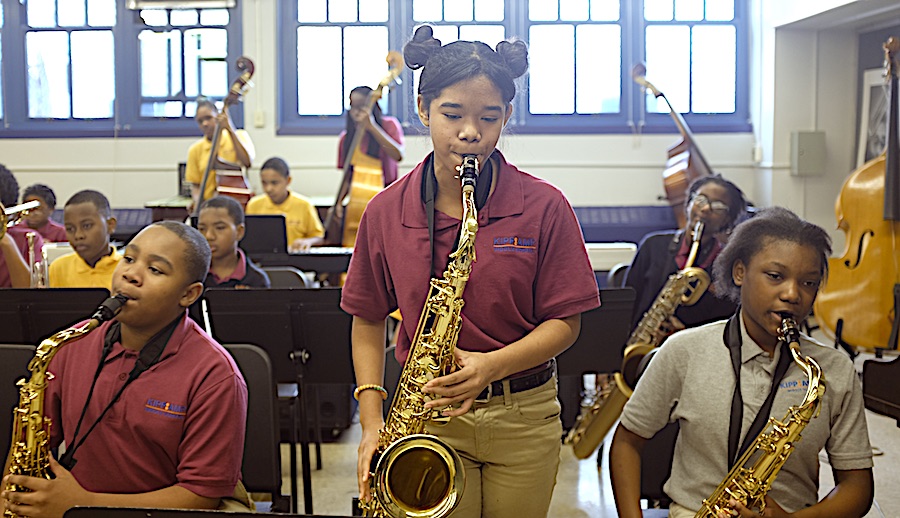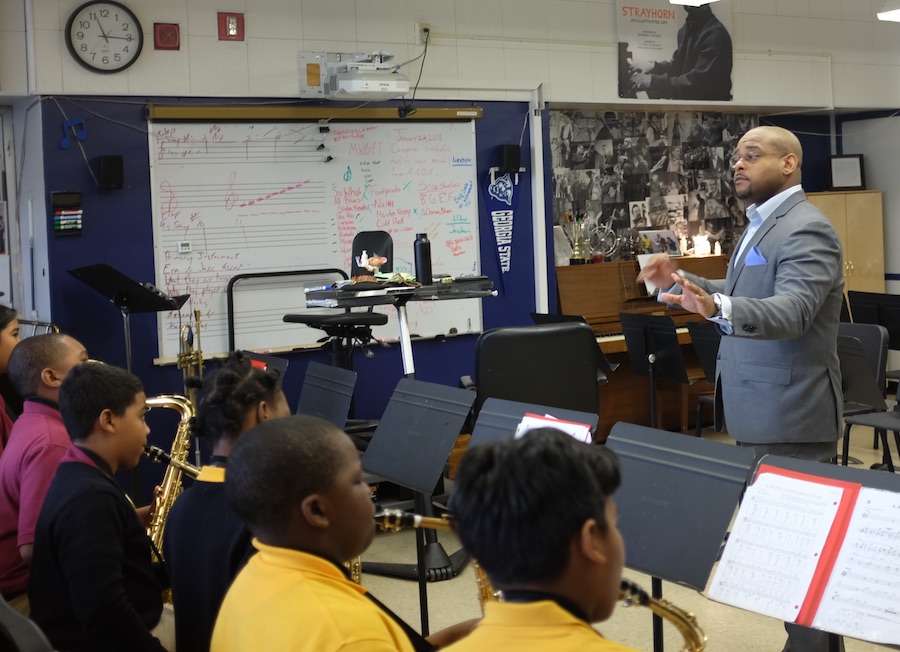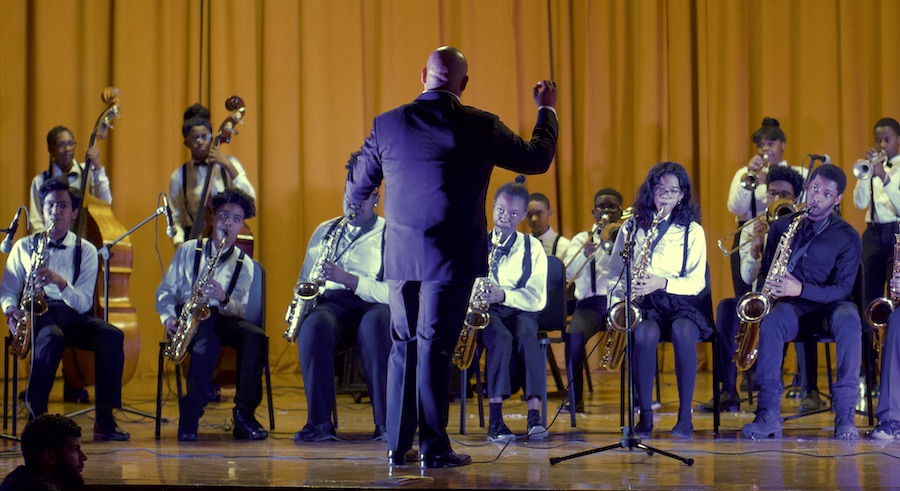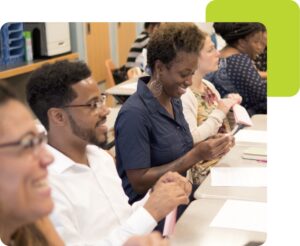Creating a Music Legacy at KIPP NYC

The idea behind the pilot program is to give kids exposure to music from Kindergarten onwards, so by the time they get to 5th grade, they’re more prepared for the next level of music classes.
The arts are one of the best ways to reach, and teach, students. At KIPP, we believe an arts education is vital to both academic and character development. That’s why each of our schools has a music program. This year, we’re piloting a vision for a unified K-8 music program at the KIPP AMP campus in Brooklyn, led by Jamison Chandler, with the goal of expanding what we learn and implementing successes across the entire KIPP NYC region.
“Because we have such a talented community of artists in our schools,” says KIPP NYC Chief Financial Officer (and bass player herself) Charizma Williams, “we want to capture all of their creativity and ensure they drive the development of arts programming from curriculum development to setting standards and benchmarks.” Williams is partnering with Chandler on this pilot program on everything from staffing to professional development. “We want to make sure that our arts teachers are continually developed like our other content area teachers are,” she says.
To learn more, we chatted with Mr. Chandler, who was recently awarded KIPP’s Harriett Ball Excellence in Teaching Award for his outstanding work in building his students chops and character.
Tell us about the music transition from elementary to middle school. Do many students enter 5th grade with music experience?
Jamison Chandler: Normally, kids would come to me in middle school without any music experience, having never touched an instrument or being able to read notation. The idea behind the pilot program is to give kids exposure to music from Kindergarten onwards, so by the time they get to 5th grade, they’re more prepared for the next level of music classes.
Just think about our academic classes and imagine if students came to your class already performing at grade level. It’s no different for music. Our new elementary school music program allows for 3rd grade students to start playing instruments, so that by the time they get to the 5th grade they are already playing at a 7th or 8th grade level.
At KIPP we are already trying to get our students into the best possible music programs and collegiate institutions. We have partnerships with Lincoln Center, Carnegie Hall, Pre-Juilliard, and also Litchfield. If we can start that process as early as possible, and get our students to be competitive in the world in situations where they are with students that don’t look like them and are from different socioeconomic backgrounds, that’s preparing them for the world at large. If they don’t become world premiere musicians, that’s ok and that is not the goal of the program. It’s more important for our KIPPsters to have access.
Watch a clip of the KIPP AMP Legacy Jazz Ensemble performing “Moanin'” by Charles Mingus
Tell us more about the music program at KIPP AMP
JC: I founded the Jazz band here in 2009 and prior to this I taught at Georgia Tech, Georgia State, Spelman, and Morehouse. I just took all those components and connections and used them to benefit my students, so anything I have had access to, my students also have access to. We also have the largest number of students on scholarship at the Jazz at Lincoln Center Youth Program in the entire city. I don’t think of them like they are middle school kids I think of them like they are my college students, which is why normally the top 20% of every class at Lincoln Center comes out of the music program at KIPP AMP.
I see students daily just like our math or ELA teachers. Music is given the same credence as a traditional academic discipline and the way I have created the curriculum is that it is an interdisciplinary format. Meaning that, every single subject is taught in this one class but through the lens of music. In math or ELA for example, students learn how to do mathematical computation through reading music, or students learn how to formulate Jazz solos based upon using the format for building an essay.
Here at AMP, music is four days a week and we have after school rehearsal everyday as well from 4-6pm. Every student at AMP takes music in 5th grade and we then treat it like a collegiate format. Every student cycles through the co-curricular classes that we have and then in the third quarter they make a decision on what they are going to major in, so from the fourth quarter in 5th grade to when the end of 8th grade, they stay in that particular discipline.
What does your day as a music educator look like?
JC: My day usually starts the night before! I review what I am going to be doing for my lessons the next day and set up any materials. I teach three instrumental music classes where I play with the students, in addition to working on and listening to tunes. I also teach a 5th grade music appreciation class, where we work on reading music and rhythmic analysis. In a day we typically go through musicology, nomenclature, performance, building repertoire and listening. My day usually ends after rehearsal.
To what extent do music teachers collaborate across KIPP NYC?
JC: We have been working on that for a while now. We have this belief that every program should basically have its own individual vision and we are now trying to find the commonalities. I am hoping that within the next 1-3 years that we’ll have a baseline curriculum that all students should know no matter what type of instrumentation you have and no matter what type of music you are teaching. There is still foundational work in music that should be done at each program, and so by the time our kids are done in middle school they should be able to pass a college level music theory test. My kids are able to pass with a 75% or higher on a theory placement test for Juilliard, and that is what you want to have across the network. Kids should be getting to high school and knowing what a major scale is or what a minor scale is. I am hopeful to see what we can come up with.
Bonus Question! Any tips for new music teachers?
JC: Plan! Plan ahead and I would also say partner up with someone who has done it for a while, because the biggest learning curve is going to be planning. You never know what is going to happen, it is always better to be over prepared with your lesson planning. Everything from the charts you choose to the arrangements that you write are going to come from planning, it’s important to have a vision in your head for what it is that you want. Then you can scaffold back, how you are going to be getting there.



